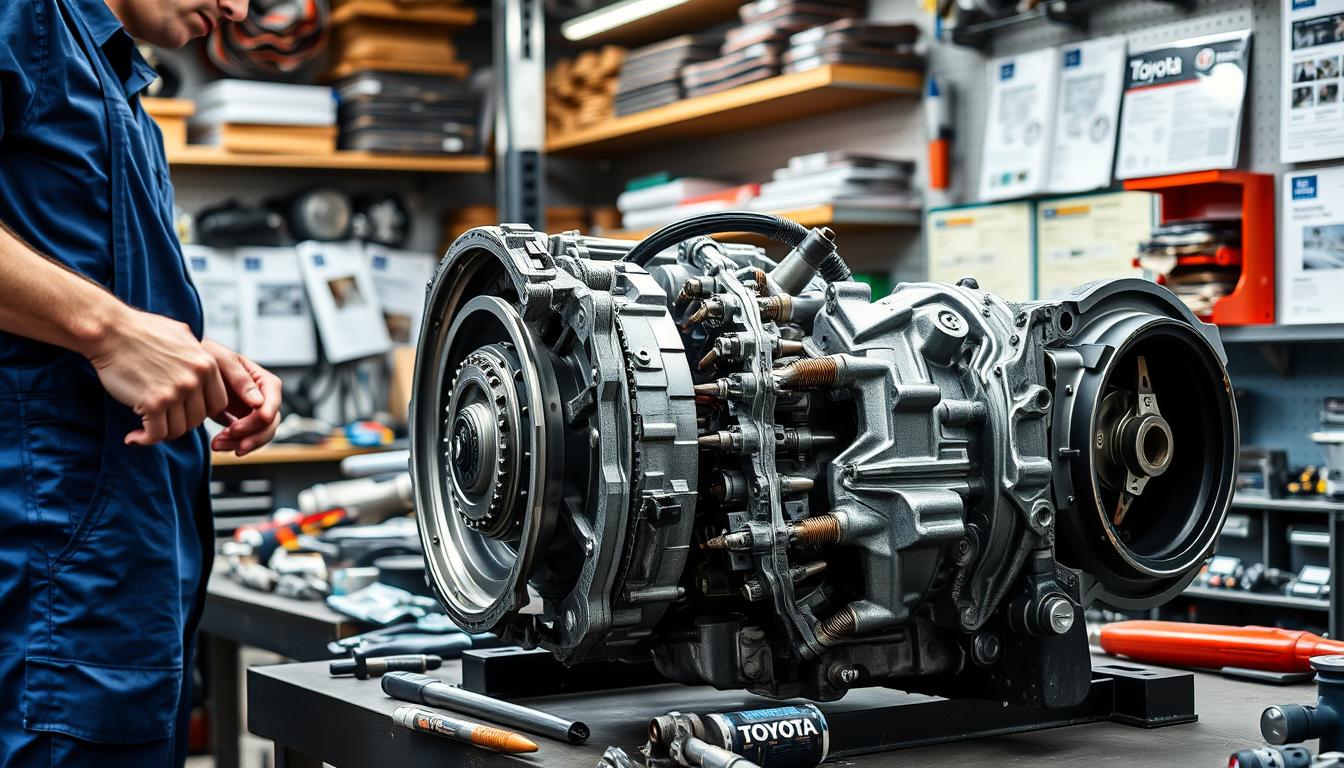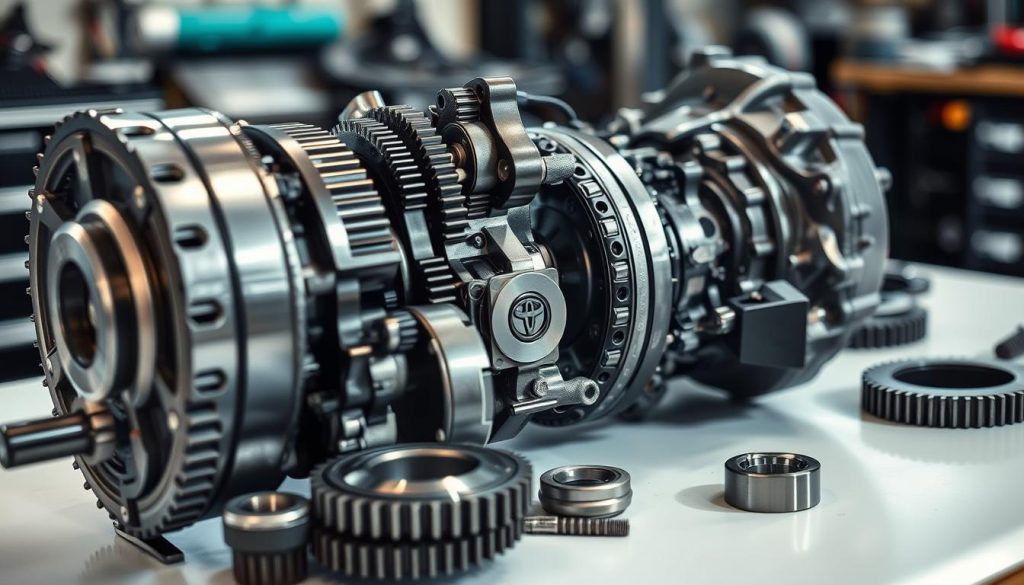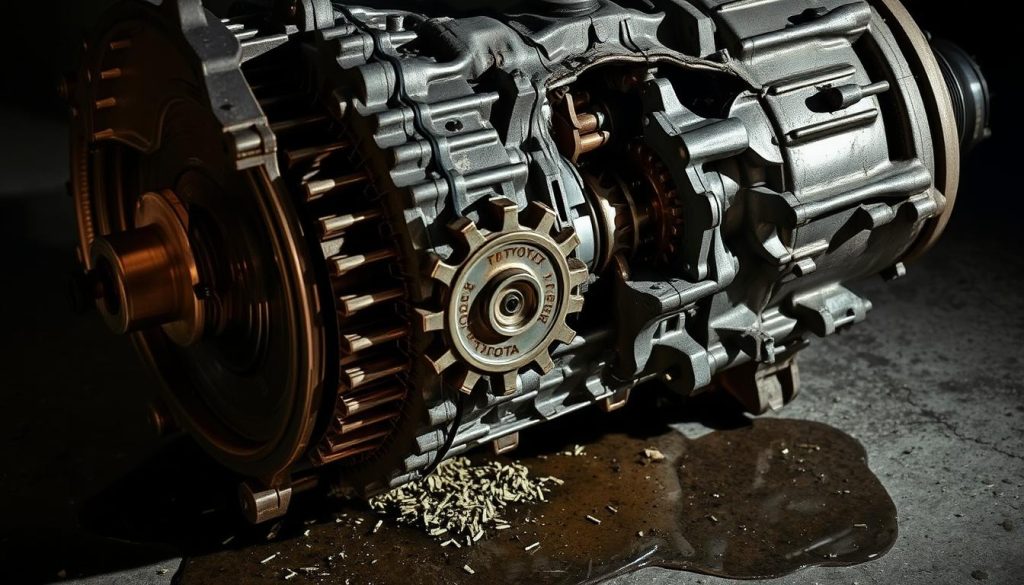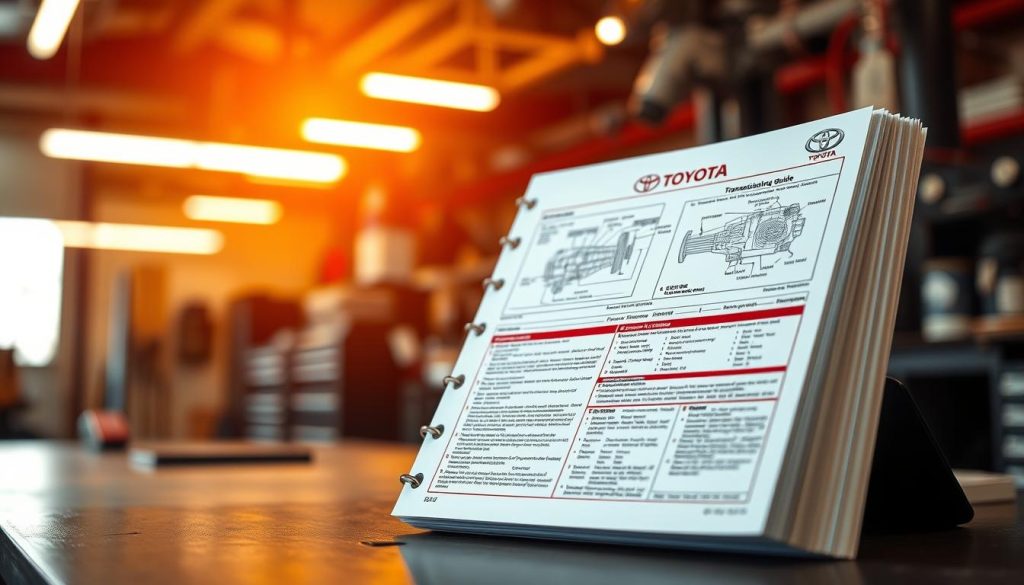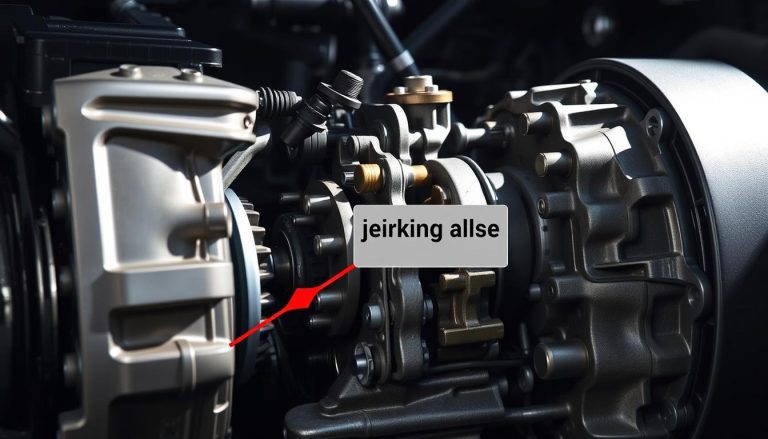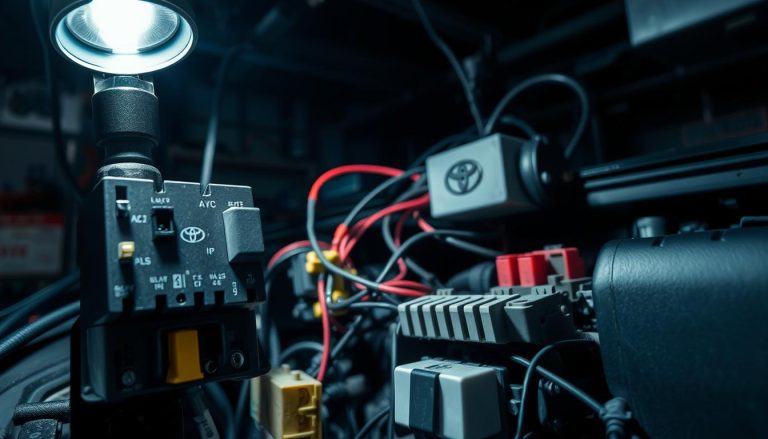Toyota Transmission Issues: Causes & Solutions
The transmission is key in a car, helping the engine power the wheels. Even Toyota, known for its reliability, faces transmission problems. Catching these early can save you from bigger expenses later.
Nelson Toyota’s experts are skilled in fixing these issues. They offer advice and hands-on help.
Understanding the Importance of Transmission in Your Toyota
The transmission is key in your Toyota, making sure power gets to the wheels. It helps the car move smoothly and efficiently. Keeping your Toyota’s transmission in good shape means you avoid problems and enjoy a reliable drive.
Role of Transmission in Vehicle Performance
The transmission makes sure the right power goes to the wheels. This is important for speeding up and saving fuel. Good gear shifting means a smooth ride and less wear on the engine and drivetrain. Spotting and fixing Toyota transmission issues early keeps your car running well.
Common Types of Transmissions in Toyotas
Toyota cars come with different transmissions, each with its own benefits and challenges:
- Manual Transmissions: These let you control gear changes directly. They’re reliable but need regular care to avoid problems.
- Automatic Transmissions: Common in modern Toyotas, they shift gears automatically. They’re convenient but need fluid checks and timely fixes to last long.
- Continuously Variable Transmissions (CVT): CVTs offer smooth acceleration and better fuel use. But, they need special care to avoid issues.
Knowing about these transmissions and their maintenance needs is important. If you face any issues, knowing how to fix them is key to keeping your car in great shape.
Recognizing Symptoms of Transmission Problems
Spotting transmission issues early can save you from expensive repairs. Knowing the signs of Toyota transmission failure is key to keeping your car running well.
Delayed Gear Engagement
If your Toyota takes longer to shift gears, it might have transmission trouble. This could be due to hydraulic or electronic problems.
Slipping Gears
When your car shifts out of gear unexpectedly, it’s a sign of trouble. This could mean worn parts or low fluid pressure, and you should check it right away.
Unusual Noises
Strange noises like whining, clunking, or humming from your transmission are warning signs. These sounds often mean mechanical wear or fluid issues.
Leaking Fluid
Seeing red or brown fluid under your Toyota is a serious sign. It means you need to check it fast to avoid more damage.
Burning Smell
A burning smell, like burnt toast, means your transmission fluid is too hot. This can cause big problems if not fixed. It’s a sign you shouldn’t ignore.
Dashboard Warning Lights
When your dashboard’s transmission light comes on, it’s a clear warning. This means your car’s computer has found a problem. You should check it out right away to avoid bigger issues.
| Symptom | Potential Cause |
|---|---|
| Delayed Gear Engagement | Hydraulic/Electric issues |
| Slipping Gears | Worn components/Low fluid pressure |
| Unusual Noises | Mechanical wear/Fluid problems |
| Leaking Fluid | Transmission fluid leakage |
| Burning Smell | Overheated transmission fluid |
| Dashboard Warning Lights | System-detected issue |
Common Causes of Transmission Problems
Keeping your Toyota’s transmission in good shape is key for the best car performance. Many things can go wrong with the transmission. Knowing what these are is important for fixing problems.
Low or Dirty Transmission Fluid
Transmission fluid is vital for your car’s transmission. If it’s low or dirty, it can’t do its job right. This can cause the transmission to overheat and have big problems.
Worn Clutch Components
In cars with manual transmissions, worn-out clutch parts make shifting hard. This can lead to grinding sounds, slipping gears, or not being able to shift at all.
Faulty Sensors
Automatic transmissions need sensors to work well. If these sensors fail, the car can shift erratically, use more fuel, or act strangely.
Mechanical Wear
Parts inside the transmission wear out with time. This can cause leaks, odd noises, or gears to slip.
Software Issues
Transmission computers can have bugs that make shifting bad or slow down the car. Fixing these problems might mean updating the software.
| Common Causes | Symptoms | Solutions |
|---|---|---|
| Low or Dirty Transmission Fluid | Overheating, shifting difficulty | Change or refill transmission fluid |
| Worn Clutch Components | Gear slipping, grinding noises | Replace clutch components |
| Faulty Sensors | Erratic shifting, poor fuel efficiency | Replace or repair sensors |
| Mechanical Wear | Strange noises, gear slippage | Inspect and replace worn parts |
| Software Issues | Improper shifting, reduced performance | Update or reprogram software |
Toyota Transmission Problems in Specific Models
Toyota cars are known for being reliable. But, some models and transmissions have their own problems. Knowing these issues can help you fix them early.
Issues in CVT Transmissions
CVTs are common in Toyotas for their efficiency and smooth ride. Yet, they can have problems like slow acceleration, overheating, and slipping. These issues might make repairs more expensive and need regular checks.
Tacoma Transmission Problems
The Toyota Tacoma, from 2016-2017, has had its share of transmission troubles. Owners have seen issues like rough shifting, hesitation, and slipping gears. These problems need special fixes and can be costly. Regular checks and maintenance are key to keeping your Tacoma’s transmission in good shape.
DIY Solutions for Minor Transmission Problems
Wondering how to fix Toyota transmission problems? There are DIY solutions for minor issues. These can save you time and money. You can check and refill transmission fluid, inspect its condition, reset the transmission control module, and drive properly.
Checking and Refilling Transmission Fluid
Keeping your Toyota’s transmission fluid at the right level is key. Use the dipstick to check it regularly and refill as needed. Make sure to use the fluid type recommended by the manufacturer.
Inspecting the Fluid Condition
Looking at the fluid’s condition is also important. Good transmission fluid is bright red and clean. If it’s dark or smells burnt, it’s time for a change or to see a pro.
Resetting the Transmission Control Module
Electronic glitches can sometimes cause transmission problems. Resetting the transmission control module can fix this. Just disconnect the battery for a few minutes, then reconnect it. Always check your vehicle’s manual for the right steps.
Adopting Proper Driving Habits
Driving right can also help your transmission last longer. Avoid harsh driving, sudden stops, and overloading. These habits can prevent minor issues from getting worse.
When to Seek Professional Help
Some Toyota transmission problems can be fixed at home. But, there are times when you need a pro. Issues like severe gear slipping or erratic shifting need a certified Toyota tech.
Trying to fix complex problems yourself can cause more harm. It can also cost more money. Knowing when to call a pro can save you time and money.
Think about the cost of fixing your Toyota’s transmission. A pro knows what your car needs and can give you a good price. They make sure your car gets the right care, keeping your transmission running longer.
Choosing to get help when you need it can save you money and make your car run better. A pro can find out what’s wrong and fix it right. Always get help for serious problems to keep your Toyota safe and reliable.
Professional Diagnostic and Repair Services
When your Toyota has transmission problems, getting help from experts is key. They use a detailed Toyota transmission troubleshooting guide to find and fix issues. This keeps your car running well.
Performing a Diagnostic Scan
Technicians use special tools to scan your Toyota’s transmission. They look for error codes and signals. This helps them fix problems quickly and right.
Inspecting Mechanical Components
Checking the mechanical parts is important. Experts look for wear on gears, clutches, and bands. They can then replace any damaged parts fast.
Flushing the Transmission Fluid
Flushing the transmission fluid is key to your Toyota’s health. It removes old, dirty fluid and adds new. This cuts down on friction and prevents overheating.
Reprogramming the Transmission Control Module
Software issues can be fixed by updating the transmission control module. This makes sure the transmission works well. It adjusts to how you drive and the road conditions.
Preventive Maintenance for Toyota Transmissions
Preventive maintenance is key to keeping Toyota transmissions running well. Regular maintenance helps catch problems early. This ensures your car drives smoothly and reliably.
Regular Fluid Changes
Changing transmission fluid regularly is vital. It keeps the parts moving smoothly and prevents overheating. Sticking to the recommended change schedule keeps your transmission in top shape.
Routine Inspections
Regular checks can spot issues before they get worse. Look for leaks, odd noises, or vibrations. These signs can tell you when parts might need to be replaced.
Addressing Warning Signs Early
Don’t ignore signs of trouble with your transmission. Problems like delayed gear shifts or slipping can get worse fast. Fixing them early saves you money and hassle.
Using Genuine Toyota Parts
Using genuine Toyota parts for repairs is best. They fit perfectly and keep your transmission running right. This reduces the chance of future problems.
Cost of Toyota Transmission Repairs
The cost of fixing a Toyota transmission can change a lot. It depends on how bad the damage is, the model of the Toyota, and where you get it fixed. Small fixes cost less, but big problems like overhauls or replacing the whole thing cost a lot more.
| Type of Repair | Estimated Cost |
|---|---|
| Minor Fixes (e.g., Fluid Change) | $150 – $250 |
| Sensor Replacement | $200 – $400 |
| Clutch Repairs | $700 – $1,200 |
| Transmission Rebuild | $2,000 – $4,000 |
| Transmission Replacement | $3,500 – $7,000 |
Getting a detailed check-up is key to knowing how much it will cost. Independent shops might be cheaper, but dealerships have the right skills. Knowing what you might spend helps you plan your budget better.
Transmission Issues in Newer Toyota Models
Newer Toyota models have advanced technology but can face transmission problems. These issues might include software bugs or failures in complex electronic systems. Spotting signs of Toyota transmission failure early can help avoid expensive repairs.
Even with modern engineering, newer models can show subtle signs of trouble. It’s important to know the common signs of Toyota transmission failure. This way, you can fix problems quickly and keep your car running well.
- Frequent or unusual shifting delays
- Unexplained surges or lags in power
- Inconsistent gear engagement
- Illuminated transmission warning lights on your dashboard
| Issue | Symptoms | Action Required |
|---|---|---|
| Software Glitches | Unexpected gear shifts, dashboard warnings | Update software, reset transmission module |
| Electronic System Failures | Inconsistent performance, warning lights | Professional diagnostic scan and repair |
| Fluid-related Issues | Leaking fluid, overheating | Check and replace transmission fluid |
Knowing the signs of Toyota transmission failure is key. Regular maintenance and quick action to warning signs can keep your car running smoothly for years.
Software and Technical Service Bulletins (TSBs)
Technical Service Bulletins (TSBs) are key to keeping Toyota vehicles in top shape. They address common transmission problems with fixes. These updates improve performance and extend transmission life.
Role of TSBs in Addressing Issues
TSBs target specific issues found by Toyota and reported by owners. They are not recalls but important advisories. Following TSBs helps your transmission run smoothly and reliably.
Common Software Fixes
Software updates are a common fix in TSBs for transmission issues. These updates can improve shifting and performance. Manufacturers keep updating software to fix bugs and improve compatibility.
Fluid-Related Fixes
Using the right transmission fluid is vital for your Toyota’s transmission. TSBs guide on fluid changes and types. Following these tips helps prevent fluid-related problems.
Inspecting and Replacing Hardware
TSBs also cover checking and replacing worn-out parts. This includes clutches, gears, seals, and sensors. Regular checks as advised in TSBs prevent costly repairs. Following these bulletins ensures your transmission works perfectly.
Importance of Using Toyota-Certified Service Centers
Toyota owners need to use Toyota-certified service centers for the best care. These places have techs trained just for Toyota cars. They know how to fix complex problems like transmissions.
Choosing a Toyota-certified service center means your car gets real parts. This lowers the chance of parts not fitting right or breaking down early. They use a Toyota transmission guide to find and fix problems fast.
Also, these centers have special tools made just for your car. This tech is key for finding and fixing transmission issues. They do everything from oil changes to big repairs, keeping your transmission in great shape.
For your car to stay in top condition, a Toyota-certified service center is a must. They really get Toyota’s design and use a guide for transmissions. This makes them perfect for fixing any transmission issues with skill and care.
Choosing the Right Transmission Fluid for Your Toyota
Choosing the right transmission fluid is key for your Toyota’s health and performance. There are many types, so picking the right one is important. The correct fluid makes your car run smoothly and lasts longer.
Toyota suggests specific fluids for each model and transmission type. The wrong fluid can cause a lot of damage and cost a lot to fix. Here’s a guide to help you pick the right fluid for your Toyota:
| Toyota Model | Recommended Transmission Fluid | Benefits |
|---|---|---|
| Camry | Toyota ATF WS | Enhanced smooth shifting and fuel efficiency |
| Corolla | Toyota Genuine CVT Fluid TC | Longer transmission life and better performance |
| RAV4 | Toyota ATF WS | Reduced wear and improved reliability |
| Tacoma | Toyota ATF T-IV | Superior lubrication and thermal stability |
Regular checks and replacements are also important. Keeping the right fluid levels and quality helps avoid problems. If you’re wondering how to fix Toyota transmission issues, start with the right fluid.
In short, picking the right transmission fluid for your Toyota is critical. It improves performance and extends your transmission’s life. Always follow Toyota’s advice to keep your car running well.
Impact of Driving Habits on Transmission Health
Driving habits greatly affect your Toyota’s transmission health. Actions like quick acceleration and sudden braking stress the transmission. This can cause it to wear out faster.
Also, towing your vehicle too much can strain the transmission. This can lead to higher repair costs.
On the other hand, gentle driving helps keep the transmission in good shape. Smooth starts and stops are key. Regular maintenance is also important.
By following maintenance schedules and changing fluids on time, you can improve performance. This reduces the chance of expensive repairs. Knowing how these actions affect repair costs helps you save money.
Signs Your Toyota Transmission Needs Immediate Attention
Spotting early signs of Toyota transmission failure is key to avoiding big problems and expensive fixes. A clear sign is when the gears slip a lot while driving. This is dangerous and needs a quick check by a pro.
Grinding noises from your transmission also mean trouble. They show that something inside is failing. Don’t ignore dashboard warning lights either. They often mean your transmission needs help fast.
Fluid leaks under your car are another warning sign. They point to a bad seal or gasket. This means you need to act fast to stop more damage.
To sum up, here are the main signs and what they mean:
| Symptom | Possible Cause | Immediate Action |
|---|---|---|
| Severe slipping | Worn clutch components or low fluid | Professional inspection required |
| Grinding noises | Internal component failure | Immediate mechanical check |
| Persistent dashboard warnings | System fault or malfunction | Diagnostic scan needed |
| Fluid leaks | Faulty seal or gasket | Transmission system examination |
Ignoring these signs can risk your car and cost a lot to fix. Fixing these problems quickly keeps your Toyota running well.
Conclusion
Fixing common Toyota transmission problems starts with being proactive and knowing your car well. Spotting early signs like slow gear changes and odd noises can stop small issues from getting worse. It’s also key to understand what causes these problems, like dirty or low transmission fluid and worn-out parts.
Keeping up with regular maintenance, like fluid changes and checks, is vital. Using genuine Toyota parts and fluids helps keep your car running smoothly. Good driving habits and quick action on warning signs also help avoid big transmission issues.
While you can handle some small problems yourself, knowing when to call a pro is important. Diagnostic scans and expert services can find and fix hidden problems. By following these tips, your Toyota will stay reliable, giving you peace of mind and long-lasting service.
FAQ
What is the role of the transmission in my Toyota?
The transmission is key in your Toyota. It moves power from the engine to the wheels. This makes your car go smoothly and use fuel well, keeping it in top shape.
What are the common types of transmissions in Toyotas?
Toyotas often have manual, automatic, and Continuously Variable Transmissions (CVT). Each type has its own benefits and problems.
What are the symptoms of Toyota transmission problems?
Signs include delayed gear changes, slipping gears, odd noises, fluid leaks, burning smells, and dashboard lights.
What are the common causes of Toyota transmission problems?
Issues often stem from low or dirty fluid, worn parts, faulty sensors, mechanical wear, and software bugs.
Which Toyota models are prone to specific transmission issues?
CVT issues might include slow acceleration, overheating, and slipping. The Toyota Tacoma is also known for transmission troubles that need special care.
Are there any DIY solutions for minor transmission problems?
Yes, you can check and add transmission fluid, check its condition, reset the control module, and drive carefully to help your transmission last longer.
When should I seek professional help for my Toyota transmission?
If you face serious slipping, erratic shifts, or electronic failures, even after trying basic fixes, it’s time to get expert help.
What professional diagnostic and repair services are available for Toyota transmissions?
Experts offer detailed scans, mechanical inspections, fluid flushes, and updates to the transmission control module.
What preventive maintenance practices can extend the life of my Toyota transmission?
Regular fluid changes, mechanical checks, quick action on warning signs, and using genuine Toyota parts for repairs are key.
What are the costs associated with Toyota transmission repairs?
Repair costs vary by damage, model, and repair location. Minor fixes are cheap, but major repairs can be pricey.
Are newer Toyota models immune to transmission issues?
Newer Toyotas have tech advances but can face software glitches or complex system failures.
What are Technical Service Bulletins (TSBs) and how do they help address Toyota transmission problems?
TSBs offer updates on common issues, like software fixes, fluid tips, and replacement guidelines.
Why should I use a Toyota-certified service center for transmission repairs?
Certified centers have trained techs, approved tools, and genuine parts for the best care and maintenance.
How do I choose the right transmission fluid for my Toyota?
Pick the right fluid for your Toyota for smooth operation and longevity. Regular checks and correct fluid replacements are essential.
How do my driving habits impact the health of my Toyota’s transmission?
Aggressive driving and frequent towing can wear out your transmission. Gentle driving and regular maintenance can help it last longer.
What are the critical signs indicating my Toyota transmission needs immediate attention?
Severe slipping, grinding noises, constant dashboard warnings, and fluid leaks need quick professional help to avoid more damage and high costs.

